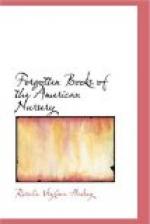Gaine himself was a prominent printer in New York in the latter half of the eighteenth century. Until the Revolution his shop was a favorite one and well patronized. But when the hostilities began, the condition of his pocket seems to have regulated his sympathies, and he was by turn Whig and Tory according to the possession of New York by so-called Rebels, or King’s Servants. When the British army evacuated New York, Gaine, wishing to keep up his trade, dropped the “Crown” from his sign. Among the enthusiastic patriots this ruse had scant success. In Freneau’s political satire of the bookseller, the first verse gives a strong suggestion of the ridicule to follow:
“And first, he was, in his
own representation,
A printer, once of good reputation.
He dwelt in the street called
Hanover-Square,
(You’ll know where it
is if you ever was there
Next door to the dwelling
of Mr. Brownjohn,
Who now to the drug-shop of
Pluto is gone)
But what do I say—who
e’er came to town,
And knew not Hugh Gaine at
the Bible and Crown.”
A contemporary of, and rival bookseller to, Gaine in seventeen hundred and sixty was James Rivington. Mr. Hildeburn has given Rivington a rather unenviable reputation; still, as he occasionally printed (?) a child’s book, Mr. Hildeburn’s remarks are quoted:
“Until the advent of Rivington it was generally possible to tell from an American Bookseller’s advertisement in the current newspapers whether the work offered for sale was printed in America or England. But the books he received in every fresh invoice from London were ’just published by James Rivington’ and this form was speedily adopted by other booksellers, so that after 1761 the advertisement of books is no longer a guide to the issues of the colonial press.”
Although Rivington did not set up a press until about seventeen hundred and seventy-three,—according to Mr. Hildeburn,—he had a book-shop much earlier. Here he probably reprinted the title-page and then put an elaborate notice in the “Weekly Mercury” for November 17, 1760, as follows:
JAMES RIVINGTON
Bookseller and Stationer from
London over against the Golden Key in
Hanover Square.
This day is published, Price,
seven Shillings, and sold by the said
JAMES RIVINGTON, adorned with two hundred Pictures
THE
FABLES OF AESOP
with a moral to each Fable in Verse, and an Application in Prose, intended for the Use of the youngest of readers, and proper to be put into the hands of Children, immediately after they have done with the Spelling-Book, it being adapted to their tender Capacities, the Fables are related in a short and lively Manner, and they are recommended to all those who are concerned in the education of Children. This is an entire new Work, elegantly printed and ornamented with much better Cuts




